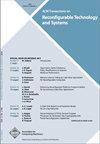流聚合与压缩滑动窗口
IF 2.8
4区 计算机科学
Q2 COMPUTER SCIENCE, HARDWARE & ARCHITECTURE
引用次数: 0
摘要
高性能流聚合对于许多分析大量数据的新兴应用程序至关重要。在处理过程中,传入的数据需要存储在滑动窗口中,以防聚合函数不能增量计算。用新的传入值更新窗口并读取窗口以提供聚合函数是流聚合中的两个主要步骤。尽管使用多级队列可以有效地支持窗口更新,但频繁的窗口聚合仍然是性能瓶颈,因为它们给内存带宽和容量带来了巨大的压力。本文通过增强StreamZip来解决这个问题,StreamZip是一个能够压缩滑动窗口的数据流聚合引擎。StreamZip处理了许多数据和控制依赖的挑战,在流聚合管道中集成了一个压缩器,减轻了频繁聚合带来的内存压力。此外,StreamZip还集成了一个缓存机制,用于处理传入数据流中的斜键分布。这样,StreamZip提供了更高的吞吐量以及更大的有效窗口容量来支持更大的问题。StreamZip支持多种压缩算法,为整数和浮点数提供无损和有损压缩。与没有压缩的设计相比,StreamZip无损和有损设计的吞吐量分别提高了7.5倍和22倍,同时有效内存容量分别提高了5倍和23倍。本文章由计算机程序翻译,如有差异,请以英文原文为准。
Stream Aggregation with Compressed Sliding Windows
High performance stream aggregation is critical for many emerging applications that analyze massive volumes of data. Incoming data needs to be stored in a sliding window during processing, in case the aggregation functions cannot be computed incrementally. Updating the window with new incoming values and reading it to feed the aggregation functions are the two primary steps in stream aggregation. Although window updates can be supported efficiently using multi-level queues, frequent window aggregations remain a performance bottleneck as they put tremendous pressure on the memory bandwidth and capacity. This article addresses this problem by enhancing StreamZip, a dataflow stream aggregation engine that is able to compress the sliding windows. StreamZip deals with a number of data and control dependency challenges to integrate a compressor in the stream aggregation pipeline and alleviate the memory pressure posed by frequent aggregations. In addition, StreamZip incorporates a caching mechanism for dealing with skewed-key distributions in the incoming data stream. In doing so, StreamZip offers higher throughput as well as larger effective window capacity to support larger problems. StreamZip supports diverse compression algorithms offering both lossless and lossy compression to integers as well as floating-point numbers. Compared to designs without compression, StreamZip lossless and lossy designs achieve up to 7.5× and 22× higher throughput, while improving the effective memory capacity by up to 5× and 23×, respectively.
求助全文
通过发布文献求助,成功后即可免费获取论文全文。
去求助
来源期刊

ACM Transactions on Reconfigurable Technology and Systems
COMPUTER SCIENCE, HARDWARE & ARCHITECTURE-
CiteScore
4.90
自引率
8.70%
发文量
79
审稿时长
>12 weeks
期刊介绍:
TRETS is the top journal focusing on research in, on, and with reconfigurable systems and on their underlying technology. The scope, rationale, and coverage by other journals are often limited to particular aspects of reconfigurable technology or reconfigurable systems. TRETS is a journal that covers reconfigurability in its own right.
Topics that would be appropriate for TRETS would include all levels of reconfigurable system abstractions and all aspects of reconfigurable technology including platforms, programming environments and application successes that support these systems for computing or other applications.
-The board and systems architectures of a reconfigurable platform.
-Programming environments of reconfigurable systems, especially those designed for use with reconfigurable systems that will lead to increased programmer productivity.
-Languages and compilers for reconfigurable systems.
-Logic synthesis and related tools, as they relate to reconfigurable systems.
-Applications on which success can be demonstrated.
The underlying technology from which reconfigurable systems are developed. (Currently this technology is that of FPGAs, but research on the nature and use of follow-on technologies is appropriate for TRETS.)
In considering whether a paper is suitable for TRETS, the foremost question should be whether reconfigurability has been essential to success. Topics such as architecture, programming languages, compilers, and environments, logic synthesis, and high performance applications are all suitable if the context is appropriate. For example, an architecture for an embedded application that happens to use FPGAs is not necessarily suitable for TRETS, but an architecture using FPGAs for which the reconfigurability of the FPGAs is an inherent part of the specifications (perhaps due to a need for re-use on multiple applications) would be appropriate for TRETS.
 求助内容:
求助内容: 应助结果提醒方式:
应助结果提醒方式:


